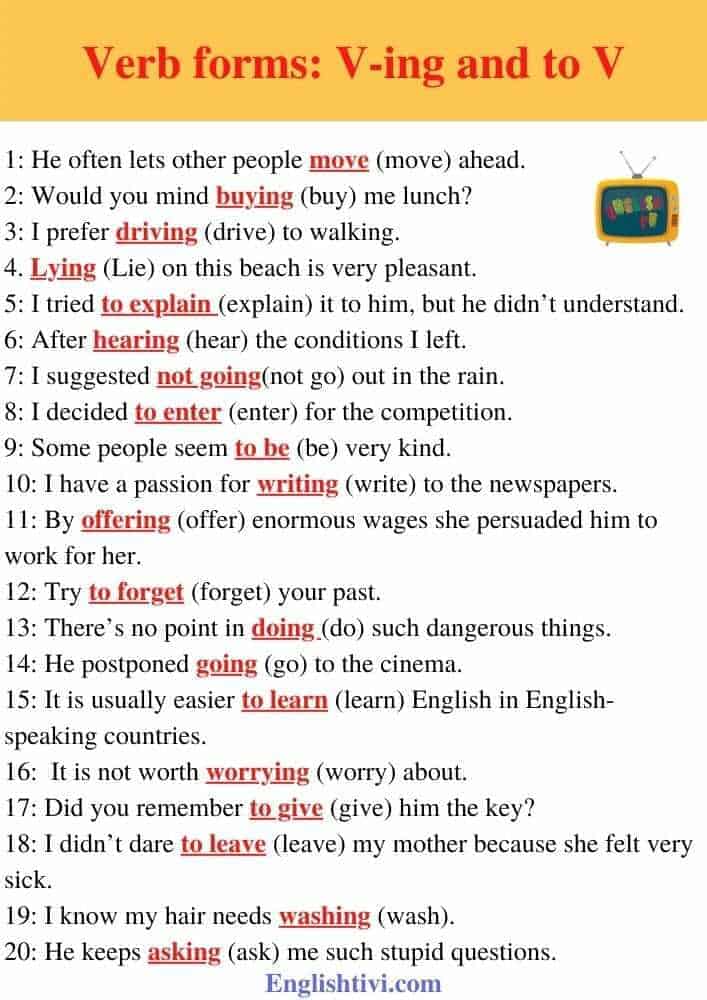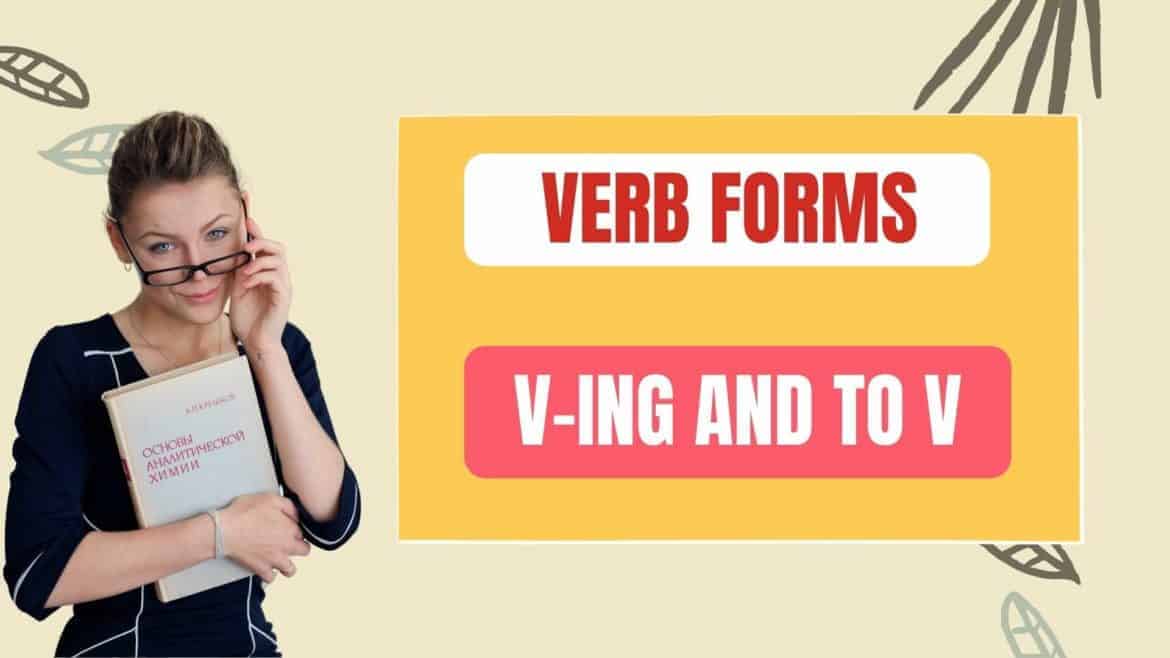One of the most asked questions by exam reviewers is how to choose the correct answer in the questions related to V-ing and to V?
⏩ Sign Up to Get Bonus
Today English tivi will take a look at the most common sentence structures of V-ing and To-V. Hopefully, you will no longer have any difficulty with the different types of V-ing or To-V in the process of doing the test.
You might also like: ALL the English Grammar Basics You Need
How to Use V-ing and to V in English
| V-ING | TO V |
| 1. As the subject of a sentence: – Dancing bored him. 2. Verb complement: – Her hobby is painting. 3. As a complement: – Seeing is believing. 4. After preposition and verb + preposition: apologies for, accuse of, insist on, feel like, congratulate on, suspect of, look forward to, dream of, succeed in, object to, approve/disapprove of… – He was accused of smuggling. 5. After a few verbs: avoid, mind, enjoy, admit, delay, excuse, consider, deny, finish, imagine, forgive, keep, miss, postpone, practice, resist, risk, propose, detest, dread, resent, pardon, fancy… – He admitted taking the money. – Would you consider selling the property? – He kept complaining. 6. Follow phrases like: – It’s no use / It’s no good… – There’s no point (in)… – It’s (not) worth … – Have difficult/ trouble (in) … – It’s a waste of time/ money … – Spend/ waste time/money … – Be/ get used to … – Be/ get accustomed to … – Do/ Would you mind…? – Be busy – What about…? How about…? – Go + V-ing (go shopping, go swimming…) | 1. The following verbs are followed directly by to V: agree, appear, arrange, attempt, ask, decide, determine, fail, endeavor, happen, hope, learn, manage, offer, plan, prepare, promise, prove, refuse, seem, tend, threaten, volunteer, expect, want,… – She agreed to pay $50. – Two men failed to return from the expedition. – The remnants refused to leave. – She volunteered to help the disabled. – He learnt to look after himself. 2. Verb + how/ what/ when/ where/ which + to V The verbs that use this formula are: ask, decide, discover, find out, forget, know, learn, remember, see, show, think, understand, want to know, wonder… – He discovered how to open the safe. – I found out where to buy fruit cheaply. – She couldn’t think what to say. – I showed her which button to press. 3. Verb + Object + to V The verbs that follow this formula are: advise, allow, enable, encourage, forbid, force, hear, instruct, invite, order, permit, persuade, request, remind, train, urge, want, tempt… – These glasses will enable you to see in the dark. – She encouraged me to try again. – They forbade her to leave the house. – They persuaded us to go with them. |
Some Special Verbs Can Be Combined with Both V-ing and to V
Note: Some verbs can go with both To V and V-ing, compare the difference in meaning between them.
Stop
+ Stop V-ing: stop doing something (stop completely)
+ Stop to V: stop to do something
- Stop smoking
- Stop to smoke
Remember
+ Remember/forget/regret to V: (present – future)
+ Remember/forget/regret V-ing: (in the past)
- Remember to send this letter.
- Don't forget to buy flowers.
- I regret to inform you that the train was canceled.
- I paid her $2. I still remember that. I still remember paying her $2.
- She will never forget meeting the Queen.
- He regrets leaving school early. It is the biggest mistake in his life.
Try
+ Try to V:
+ Try V-ing:
- I try to pass the exam.
- You should try unlocking the door with this key.
Like
+ Like V-ing: like doing something because it's interesting, interesting, attractive, doing it for common sense.
+ Like to do: do it because it is good and necessary.
- I like watching TV.
- I want to have this job. I like to learn English.
Prefer
+ Prefer V-ing to V-ing
+ Prefer + to V + rather than (V)
- I prefer driving to traveling by train.
- I prefer to drive rather than travel by train.
+ Mean to V
+ Mean V-ing
- He doesn't mean to prevent you from doing that.
- This sign means not going into.
Need
+ Need to V
+ Need V-ing (= need to be done)
- I need to go to school today.
- Your hair needs cutting. (= your hair needs to be cut).
Used to/ Be/Get used to
+ Used to V: used to/usually do in the past (don't do it now)
+ Be/Get used to V-ing: get used to something (in the present)
- I used to get up early when I was young.
- I'm used to getting up early.
Advise/allow/permit/recommend
+ Advise/allow/permit/recommend + Object + to V:
+ Advise/allow/permit/recommend + V-ing:
- He advised me to apply at once.
- He advised applying at once.
- They don't allow us to park here.
- They don't allow parking here.
See/hear/smell/feel/notice/watch
+ See/hear/smell/feel/notice/watch + Object + V-ing:
+ See/hear/smell/feel/notice/watch + Object + V:
- I see him passing my house every day.
- She smelt something burning and saw smoke rising.
- We saw him leave the house.
- I heard him make arrangements for his journey.
V-ing and to V Exercise
Exercise
1: He often lets other people……………….. (move) ahead.
2: Would you mind………………..(buy) me lunch?
3: I prefer………………..(drive) to walking.
4. ………………..(Lie) on this beach is very pleasant.
5: I tried………………..(explain) it to him, but he didn’t understand.
6: After………………..(hear) the conditions I left.
7: I suggested………………..(not go) out in the rain.
8: I decided………………..(enter) for the competition.
9: Some people seem………………..(be) very kind.
10: I have a passion for………………..(write) to the newspapers.
11: By………………..(offer) enormous wages she persuaded him to work for her.
12: Try………………..(forget) your past.
13: There’s no point in………………..(do) such dangerous things.
14: He postponed………………..(go) to the cinema.
15: It is usually easier………………..(learn) English in English-speaking countries.
16: It is not worth………………..(worry) about.
17: Did you remember………………..(give) him the key?
18: I didn’t dare………………..(leave) my mother because she felt very sick.
19: I know my hair needs………………..(wash).
20: He keeps ………………..(ask) me such stupid questions.
Answers
1: He often lets other people move (move) ahead.
2: Would you mind buying (buy) me lunch?
3: I prefer driving (drive) to walking.
4. Lying (Lie) on this beach is very pleasant.
5: I tried to explain(explain) it to him, but he didn’t understand.
6: After hearing (hear) the conditions I left.
7: I suggested not going(not go) out in the rain.
8: I decided to enter (enter) for the competition.
9: Some people seem to be (be) very kind.
10: I have a passion for writing (write) to the newspapers.
11: By offering (offer) enormous wages she persuaded him to work for her.
12: Try to forget (forget) your past.
13: There’s no point in doing (do) such dangerous things.
14: He postponed going (go) to the cinema.
15: It is usually easier to learn (learn) English in English-speaking countries.
16: It is not worth worrying (worry) about.
17: Did you remember to give (give) him the key?
18: I didn’t dare to leave (leave) my mother because she felt very sick.
19: I know my hair needs washing (wash).
20: He keeps asking (ask) me such stupid questions.

Read more: English Grammar
Conclusion
Now, do you understand how to use “V-ing” and “to V”? Let's accompany English English tivi to learn more useful lessons!
Subscribe to the English TV channel on Youtube to improve your English skills!





